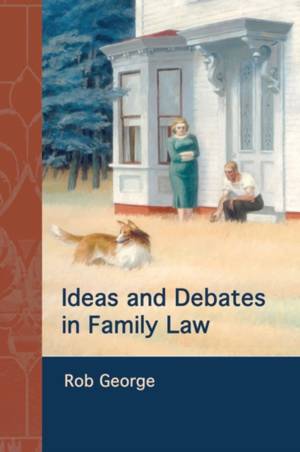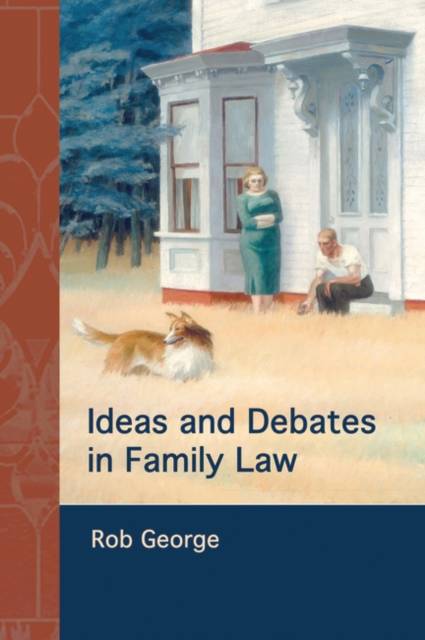
- Retrait gratuit dans votre magasin Club
- 7.000.000 titres dans notre catalogue
- Payer en toute sécurité
- Toujours un magasin près de chez vous
- Retrait gratuit dans votre magasin Club
- 7.000.0000 titres dans notre catalogue
- Payer en toute sécurité
- Toujours un magasin près de chez vous
Description
Ideas and Debates in Family Law is written for family law students, at undergraduate level and beyond, who are looking for less orthodox ideas about family law. The book's first section looks at themes in family law, addressing challenges facing the family justice system, rights and responsibilities, and the internationalisation of the law regulating families. The second section is focused on adult relationships: it suggests new ways for the law to allocate legal consequences for families, debates the consequences of the 'contractualisation' of marriage, and explores the value of 'fairness' in family finances. The third section is about children, discussing the welfare principle, parental responsibility and practical parenting. Although these issues sound common enough in a family law book, the discussions found here are far from common. Useful by itself or alongside a textbook, Ideas and Debates in Family Law offers new and thought-provoking perspectives on family law issues.
'Rob George is a new, distinctive and powerful voice in family law scholarship. In this book he subjects received and emerging opinions to incisive examination, providing readers with the intellectual invigoration associated with first class seminars. Above all, he re-claims family law as a significant branch of the idea and practice of justice.'
John Eekelaar, Pembroke College, Oxford
'Building on a successful format for undergraduate seminars in Oxford, this unique student text presents an exciting array of thought-provoking debates and intellectually stimulating, sometimes unorthodox, ideas. It will help students to situate their knowledge and to think more deeply and critically about family law and policy. I applaud this book's focus and content and Rob George's vision in writing it.'
Stephen Gilmore, King's College London
'Whether you are a student looking for interesting points to make your work first class or an academic wanting an overview of family law theory, this is the book for you. Rob George has brilliantly captured the main issues facing family lawyers and policy makers at this fascinating time. All the major concepts in family law - marriage; parenthood; family - are having to be rethought and redefined. This book provides an excellent starting point for how we might go about reimagining family law and policy.'
Jonathan Herring, Exeter College, Oxford
'Rob George is a new, distinctive and powerful voice in family law scholarship. In this book he subjects received and emerging opinions to incisive examination, providing readers with the intellectual invigoration associated with first class seminars. Above all, he re-claims family law as a significant branch of the idea and practice of justice.'
John Eekelaar, Pembroke College, Oxford
'Building on a successful format for undergraduate seminars in Oxford, this unique student text presents an exciting array of thought-provoking debates and intellectually stimulating, sometimes unorthodox, ideas. It will help students to situate their knowledge and to think more deeply and critically about family law and policy. I applaud this book's focus and content and Rob George's vision in writing it.'
Stephen Gilmore, King's College London
'Whether you are a student looking for interesting points to make your work first class or an academic wanting an overview of family law theory, this is the book for you. Rob George has brilliantly captured the main issues facing family lawyers and policy makers at this fascinating time. All the major concepts in family law - marriage; parenthood; family - are having to be rethought and redefined. This book provides an excellent starting point for how we might go about reimagining family law and policy.'
Jonathan Herring, Exeter College, Oxford
Spécifications
Parties prenantes
- Auteur(s) :
- Editeur:
Contenu
- Nombre de pages :
- 178
- Langue:
- Anglais
Caractéristiques
- EAN:
- 9781849462549
- Date de parution :
- 08-08-12
- Format:
- Livre broché
- Format numérique:
- Trade paperback (VS)
- Dimensions :
- 155 mm x 231 mm
- Poids :
- 294 g

Les avis
Nous publions uniquement les avis qui respectent les conditions requises. Consultez nos conditions pour les avis.






